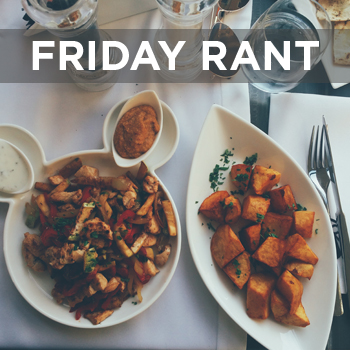 [Note: On Fridays we post new rants from one of our writers, edited only for typos and spelling.This new series is not for those easily offended or for those who only like to play nice. So read this before you start posting your comments.]
[Note: On Fridays we post new rants from one of our writers, edited only for typos and spelling.This new series is not for those easily offended or for those who only like to play nice. So read this before you start posting your comments.]
Ah, Instagram. The home of our beloved #foodporn and #wordporn.
These tags are casual and edgy ways to appreciate glorious, towering burgers and macaron-embellished cakes, or a short poem that captures our hearts. They’re also really destructive uses of language. And we need to stop.
Look, I’m no stranger to ‘rule 34’ (If it exists, there is porn for it), and I know people have fetishes. But obviously, this classic tag has nothing to do with actual arousal. My problem is not with people lusting after desserts or floggin’ the dolphin while reading prose but with the implications of the flippant use of the term ‘porn’.
I have two definitions for you.
1) Porn is graphic depiction of a sex act to stimulate erotic rather than aesthetic and emotional responses.
2) Art is the application of human creativity, often to stimulate powerful emotional responses.
Let us not get these two mixed up. Some say that pornography and the videography involved is an art form—but the most important part of porn is the whole getting turned on by watching other people have sex thing, right? Otherwise it’s just a really bad soap opera. So, porn is not art. And art is not porn.
[ctt title=”Porn is not art. And art is not porn.” tweet=”‘Porn is not art. And art is not porn.’ – http://ctt.ec/j15Aw+ (by @X3church @GSpotMinistries)” coverup=”j15Aw”]
This is important:
You are allowed to feel emotion without sexualizing it.
You are allowed to appreciate food, beauty or depth, without associating it with orgasm and sexual power.
In fact, we should feel emotion like this. We should appreciate freely like this. Let us not be reduced to sexual consumers! Let me clarify, there is nothing wrong with sex itself. I say, enjoy your God-given, Gatorade-fueled sex fests with your spouse, but keep it sacred. Be sexual in the right context. That context is not on your Instagram feed, in a hipster cafe or anywhere else you might be tempted to pull out some edgy hashtags.
[shortcode-variables slug=”30-day-challenge-inline”]We are participating in a culture that mistakes any excitement for the sexual kind, and in which any enjoyment is instantly suggestive. To want something, is to ‘want’ something—erotically. These hashtags are killing our ability to appreciate and let deep emotion sit within us. That is a terribly sad thing!
I know when people tag, they don’t actually mean they are turned on by that Katherine Sabbath cake or romantic poem; it’s a bit of fun, there’s no sexual drive. But I think it is so important to consider language and the implications using it this way brings, especially for young people.
Before you post, tag, or share, think about what you’re sexualizing. Think about what you’re trivializing. Think about what you’re normalizing.
Consider the porn addict, star, or spouse suffering betrayal trauma, to whom the word ‘porn’ is triggering. Think about the young person who searches #foodporn or simply the term ‘porn’, after seeing a harmless phrase on a friend’s social media. Think about the author or creator whose beautiful work has been reduced to a sexual object.
This is nit-picking on language, I know. There are bigger fish to fry. But language is powerful. It shapes culture, attitudes and the future.
Stop using #foodporn and #wordporn.
It’s not porn, it’s just beautiful.

